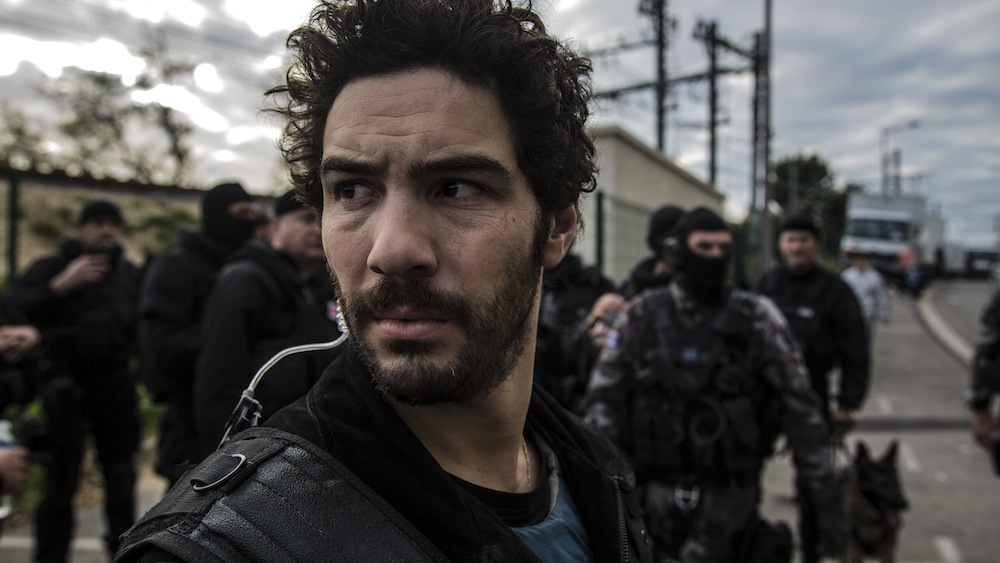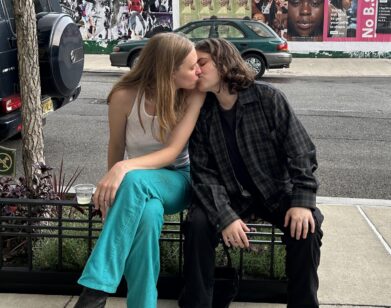Cops and Robbers

ABOVE: TAHAR RAHIM AS KHALIL IN THE LAST PANTHERS. PHOTO COURTESY OF JONATHAN OLLEY/SUNDANCETV
The Last Panthers is a spiraling, pan-European thriller that begins with a bank heist in Marseille. Dressed as painters, three Serbian men steal millions of euros worth of diamonds from an upscale bank. As they flee, one gets shot in the shoulder, another accidentally shoots a young girl, and the third—the group’s leader played by Croatian actor Goran Bogdan—slips away more seamlessly. Later, we learn that he was once a member of the legendary crime syndicate the Pink Panthers.
Premiering in the U.S. tomorrow on SundanceTV, The Last Panthers follows three disparate protagonists as they deal with the aftermath of the robbery. There is Khalil, a cop from the projects of Marseille played by Tahar Rahim; Naomi, a British insurance agent played by Samantha Morton; and Bogdan’s Serb Milan. Created by Jack Thorne and directed by Johan Renck, the series feels boundless. Slipping between French, English, and Serbian, the narrative touches on the Yugoslav Wars, corrupt Eastern European oligarchs with political aspirations, gun-running, and social and racial tensions in the slums of the multi-cultural Marseille. With a chilling opening score by the late David Bowie, the show puts forth a Europe that is grey and grimy.
When we talk to French actor Rahim over the phone from Paris, he describes Khalil as “one of the hardest characters I’ve had to play.” It feels like a particularly striking statement; now 34, Rahim first became famous through his role in Jacques Audiard‘s gritty prison drama A Prophet (2009).
EMMA BROWN: How did you first get involved in The Last Panthers?
TAHAR RAHIM: A year and a half before, the French producers contacted me. They wanted to offer me the Khalil part. I read the script, they were not finished at the time, but I was really interested. I said, “Okay, I’ll go with you, but let me know how things go along.” We talked over the course of the process and then the other actors came onto the project. Johan came on board and I saw his job before. We talked and I was really happy to be a part of this adventure.
The story was as big as it is right now, but it was different. I had some little things to say about the dialogue and what it is exactly to be a young man who has grown up in a French suburb and become a cop. We talked about all of that and some little things changed here and there, but the main tone was there already.
BROWN: Marseille has a very specific history in terms of immigration and socio-economic tensions. How much did you know about the history of Marseille?
RAHIM: I knew not a lot, but I knew certain things about Marseille because I lived there for a year in 2001. I was a student living in the center of the city, so I knew that, but not more. I knew nothing about the suburbs and trafficking and all that we talk about in the series.
BROWN: The history of Serbia is also quite important in the story. Did you get a crash-course in Serbian politics?
RAHIM: I knew as much as a young Frenchman could know today. I heard about the war—what happened in the ’90s—and the Pink Panthers. I knew they were doing big, spectacular heists and they wouldn’t kill anyone. But I discovered a lot about those criminals while we were shooting and during preproduction.
BROWN: You, Samantha, and Goran are the three main characters, but you don’t really directly interact in the series. Did it feel like you were all part of the same project? Or did it feel like you were doing three separate projects?
RAHIM: We didn’t spend a lot of time together because the series is like that, but we felt like we were all in the same ship, sharing the same history, the same adventure. I have to say, a lot of that is to do with Johan. [When I watched the series], I could find the DNA of Johan. When you meet him, you can feel who he is exactly as an artist and the show looks like what he wanted to do. But when you watch your own movies, you start to say, “I should of it done this way,” or “I should of done it that way.”
BROWN: Was Khalil an easy character to get into?
RAHIM: No, I don’t think so. When you read the script and you see what he does, you’re like, “Okay, he’s not a good guy.” My job was to give more empathy to Khalil, which is a hard thing when you know what he is going to do. To get what he wants he goes beyond the law, always, and in that sense he’s not a good cop. He’s like a cowboy; he wants to change bad things into good things, but his habits and the way he does it is not the right way. The only thing he does for himself and his people is to bring them into deep shit. By trying to do good, he acts like a bad guy.
[Changing things] is an obsession for Khalil. He’s absolutely obsessive and, more than that I think, absolutely egotistical. But the interesting thing about egotistical people is if you play them, you have to find empathy for them. In finding empathy, the only way to portray Khalil is that he doesn’t know what he is doing is egotistical. For him, it’s normal. When you know that, you can’t be good. You can’t think that you’re good.
BROWN: In the U.S., it’s quite a common trope to have two characters who grew up in same low-income area end up on opposite sides of the law. Is that common in France as well?
RAHIM: No, in France it’s not that common. There are more and more cops coming from the suburbs but it wasn’t like that before. It’s an unusual path. I met some cops from the suburbs and they didn’t have the same story [as Khalil]—they wanted to become a cop for a different reason. It helped me, but not a lot.
BROWN: What reasons did they give?
RAHIM: They wanted to change things, but they wanted to fight for the flag. They wanted to fight for liberty, brotherhood, and equality. For Khalil, it’s more of personal thing against where he was born than something for France. Psychologically, he just wants his father to be proud of him.
BROWN: Was the character of Khalil difficult to turn him off once you found him?
RAHIM: No, now it’s okay. When I began acting, it was not easy to get rid of characters at the end of shooting. But today, when I come home I switch off the light.
BROWN: I was reading some of your interviews, and you said you really wanted to play a character that was ruthless.
RAHIM: I would love to. Being bad is good for an actor: “How can I make people love to hate him?” There are not a lot of characters like that in French cinema. I would also love to try a musical. I don’t sing really, but I would love to try to sing and dance.
THE LAST PANTHERS PREMIERES TOMORROW, APRIL 13, ON SUNDANCETV.






